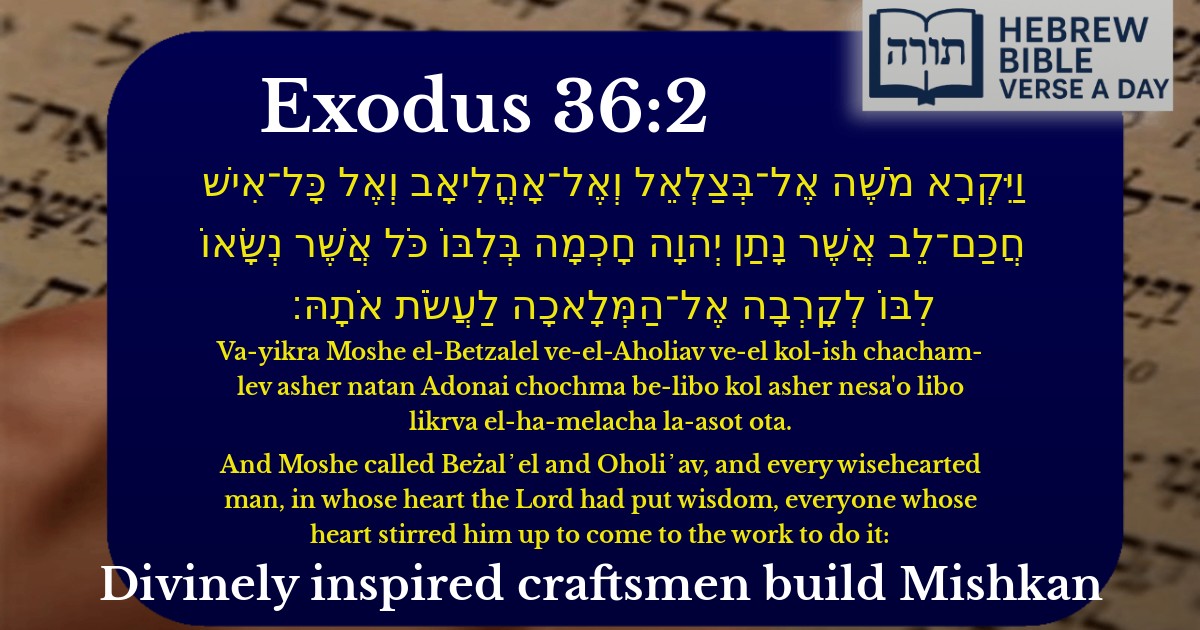Join Our Newsletter To Be Informed When New Videos Are Posted
Join the thousands of fellow Studends who rely on our videos to learn how to read the bible in Hebrew for free!
Hebrew Text
וַיִּקְרָא מֹשֶׁה אֶל־בְּצַלְאֵל וְאֶל־אָהֳלִיאָב וְאֶל כָּל־אִישׁ חֲכַם־לֵב אֲשֶׁר נָתַן יְהוָה חָכְמָה בְּלִבּוֹ כֹּל אֲשֶׁר נְשָׂאוֹ לִבּוֹ לְקָרְבָה אֶל־הַמְּלָאכָה לַעֲשֹׂת אֹתָהּ׃
English Translation
And Moshe called Beżal᾽el and Oholi᾽av, and every wisehearted man, in whose heart the Lord had put wisdom, everyone whose heart stirred him up to come to the work to do it:
Transliteration
Va-yikra Moshe el-Betzalel ve-el-Aholiav ve-el kol-ish chacham-lev asher natan Adonai chochma be-libo kol asher nesa'o libo likrva el-ha-melacha la-asot ota.
Hebrew Leining Text
וַיִּקְרָ֣א מֹשֶׁ֗ה אֶל־בְּצַלְאֵל֮ וְאֶל־אׇֽהֳלִיאָב֒ וְאֶל֙ כׇּל־אִ֣ישׁ חֲכַם־לֵ֔ב אֲשֶׁ֨ר נָתַ֧ן יְהֹוָ֛ה חׇכְמָ֖ה בְּלִבּ֑וֹ כֹּ֚ל אֲשֶׁ֣ר נְשָׂא֣וֹ לִבּ֔וֹ לְקׇרְבָ֥ה אֶל־הַמְּלָאכָ֖ה לַעֲשֹׂ֥ת אֹתָֽהּ׃
Parasha Commentary
📚 Talmud Citations
This verse is quoted in the Talmud.
📖 Berakhot 55a
The verse is referenced in a discussion about the divine wisdom granted to Bezalel and Oholiab for the construction of the Tabernacle, illustrating how God bestows wisdom upon those chosen for sacred tasks.


The Calling of the Craftsmen
The verse (Shemot 35:30) describes Moshe Rabbeinu summoning Betzalel, Aholiav, and all the chacham lev (wise-hearted individuals) to participate in the construction of the Mishkan. Rashi explains that Betzalel was specifically chosen by Hashem for his wisdom in understanding the divine instructions, even those not explicitly stated. The term chacham lev emphasizes that true wisdom is not merely intellectual but stems from a heart attuned to divine service.
Divine Wisdom and Human Initiative
The phrase "asher nasa'o libo" (whose heart stirred him) highlights the importance of personal motivation in avodas Hashem. The Ramban notes that while Hashem endowed these individuals with wisdom, their willingness to step forward was crucial. This teaches that divine assistance (siyata d'Shemaya) follows human effort and sincere desire to contribute to sacred work.
Betzalel's Unique Role
Midrash Tanchuma (Pekudei 11) elaborates that Betzalel's name—meaning "in the shadow of G-d"—reflected his ability to grasp the deeper mysteries of the Mishkan's construction. The Talmud (Berachos 55a) states that Betzalel understood how to combine the letters with which heaven and earth were created, indicating his mastery of both physical craftsmanship and spiritual wisdom.
The Partnership of Betzalel and Aholiav
Their collaboration symbolizes unity among Klal Yisrael in fulfilling a shared sacred mission.
Practical Lessons
The Kli Yakar emphasizes that the Mishkan's construction required both divinely inspired wisdom and voluntary participation. This serves as a model for all generations: when undertaking mitzvos, we must combine our talents with heartfelt enthusiasm, trusting that Hashem will guide those who sincerely seek to serve Him.